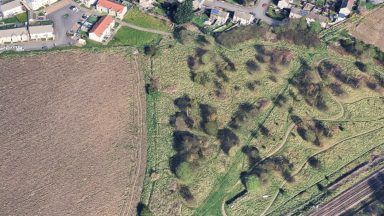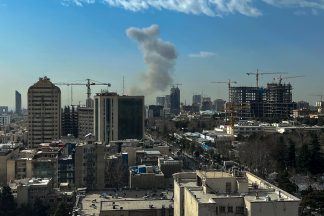More than 100 schools, nurseries and colleges in England have been told by the Government to close classrooms and other buildings that contain an aerated concrete that is prone to collapse.
It comes as the Scottish Government faces calls to address the presence of reinforced autoclaved aerated concrete (RAAC) in public sector buildings in Scotland.
A freedom of information request has revealed RAAC was present in at least four health boards and 37 schools across the country.
RAAC is a light and bubbly form of precast concrete, frequently used in public sector buildings in the UK from the mid-1950s to the mid-1990s, usually found in roofs and sometimes in walls and floors.
There are nine in Dumfries and Galloway, seven in Aberdeen, six in Clackmannanshire and five in West Lothian.
There are also two schools in each of Dundee, Highland and North Lanarkshire, and one school in each of Aberdeenshire, Argyll and Bute, East Lothian and Perth and Kinross at which the concrete is confirmed to be in use.
Investigations are still ongoing in Edinburgh, Aberdeenshire, Falkirk, North Ayrshire and North Lanarkshire.
The UK Department for Education said a “minority” of the state facilities in England will need to “either fully or partially relocate” to alternative accommodation while safety measures are installed.
Unions and opposition parties criticised the UK Government for failing to take action sooner, as schools were being shuttered ahead of the return from the summer break.
The DfE has contacted 104 settings which do not currently have mitigations in place to vacate spaces containing RAAC.
Originally it said ministers will only provide funding for works that are “capital funded” and that schools will have to pay for rental costs for emergency accommodation.
But UK schools minister Nick Gibb confirmed on Friday that the UK Government will cover “all capital costs” over disruption to educational buildings from the use of the collapse-prone concrete.
Asked on Sky News who will pay if schools need to either fully or partially relocate, Nick Gibb said: “We will pay for that. We’ve made it very clear we will cover all capital costs.
“So if in the worst-case scenario, we need portacabins in the school estate for an alternative accommodation, we will cover all those costs.
“So there has been some speculation that we won’t cover those costs. We absolutely will.”
Space in nearby schools, community centres or in an “empty local office building” was recommended for the “first few weeks” while buildings are secured with structural supports.
In guidance issued to schools, they were told that moving to pandemic-style remote education should only be considered as a “last resort and for a short period”.
Some 52 of the 156 educational settings containing the concrete have taken protective steps already this year.
Follow STV News on WhatsApp
Scan the QR code on your mobile device for all the latest news from around the country


























